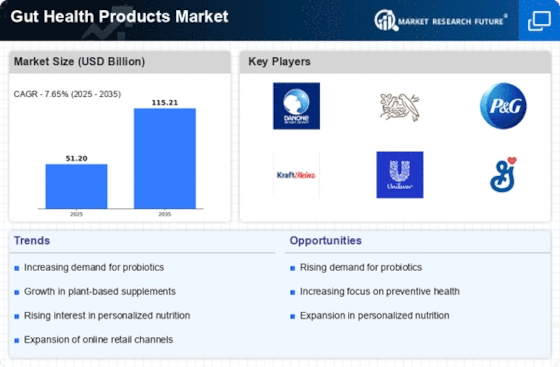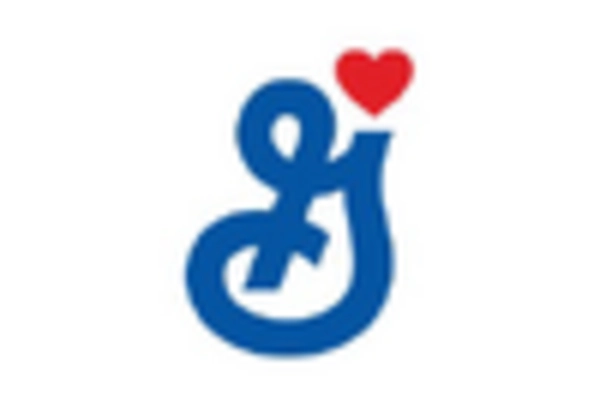Market Analysis
In-depth Analysis of Gut Health Products Market Industry Landscape
The gut health products market continues to grow, driven by an increasing understanding of the significance of intestinal wellness and the effect it has on your general health. The market for these products includes many different items, such as probiotics, prebiotics substitutes, dietary additives, and foods that are fermented, every one of which are intended to support good gut flora. Users are more aware of the link connecting digestion and other aspects of their well-being, which contributes to interest in gastrointestinal wellness goods. The first primary drivers about gut health products market lies in rising fascination in better health as well as preventative medical care. As people grow more wellness-conscious, they have a growing understanding of the importance of the digestive tract in sustaining an effective immune system, nutritional digestion, and additionally mental wellness. Such greater knowledge has resulted in an increased need for items which promote a healthy and diversified gut flora, supporting digestive wellness as the cornerstone for general wellness. Research conducted by scientists is having an important influence in determining the marketplace trends for gut health goods. Current studies reveals the complex relationship that exists among the gut microbiota and many adverse health effects. Excellent studies showing the advantages of prebiotics as well as probiotics as aids for gastrointestinal, metabolic, especially immune system function served to boost the business's reputation. Customers were more likely to purchase gut health products that are supported by evidence from science, motivating producers to spend in R&D to establish the effectiveness of what they sell. The industry is distinguished through an extensive selection of items that appeal to various customer interests and habits. Probiotics medications, foods that ferment such as curd and Korean kimchi, plus fiber found in diets all complement towards the diverse range of alternatives accessible. Companies react to customer needs for a range and efficiency by offering novel goods, for instance probiotic-infused liquids, food items, and possibly cosmetics as well as skincare offerings, which represent the various uses of gut health components. The associated gut health products market or industry is directly related to dietary modifications and interests. Considering the growing popularity of vegetarian and vegan diets, consumers have a greater need for organic prebiotics, including probiotics. Furthermore, the marketplace offers free of gluten, without lactose as well as free from allergens products to satisfy those who have special dietary requirements or sensitivity. The aforementioned adaptability guarantees that the marketplace stays open and adapts towards the changing dietary preferences of customers. Consumers learning and understanding distribution have an important influence in market trends. As customers acquire the associated positive impacts of healthy guts, they go after goods that support the particular fitness objectives. Online forums, social influencers, and healthcare advocates all help foster the spread of knowledge, changing consumer views and habits. Companies use focused advertising techniques to highlight the research underlying their goods and educate consumers regarding the benefits of having digestive tract health. Customers shape gut health products market or industry, yet so do health professionals who promote these items for a variety of medical concerns. As medical professionals understands the importance of gut health products for dealing with specific health concerns, gut health products are being more integrated into good health regimens and dietary guidelines. This partnership amongst medical practitioners along with the digestive health business strengthens the business's trustworthiness and promotes an integrated strategy to wellness and optimal health. The gut health products market or industry has become extremely competitive, including well-established businesses and fresh entrants fighting for consumer focus. Product image, good performance, and clear packaging are all important elements in determining customer trust. Businesses frequently distinguish itself via specialized marketing initiatives, collaborations with medical specialists, and the creation of new products which tackle particular medical conditions, especially digestive problems or strengthening the immune system. In summary, gut health products market will grow rapidly due to greater public understanding, research into science, as well as an increased focus on preventing illness. The business's flexibility to nutrition trends, diversified variety of goods, and partnership with doctors and hospitals assure of its capacity to fulfill the changing demands of consumers who are healthy. As the knowledge of the digestive system grows, the industry will probably stay dynamic, including continual advancements plus an emphasis on total health determining its future path.









Leave a Comment